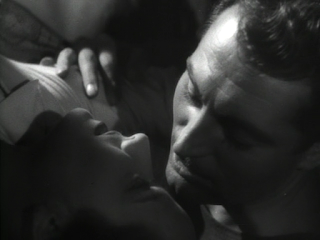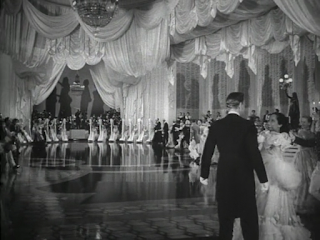Two Views of Lydia
Director: Julien Duvivier, script based on a
story (previously filmed as Un Carnet de
Bal , France, 1937) by the
director and Leslie Bush-Fekete, Ben Hecht & Samuel Hoffenstein and
André De Toth. Photography: Lee Garmes
Starring: Merle Oberon (Lydia MacMillan), Edna
May Oliver (Sarah MacMillan), Alan Marshal (Capt Richard Mason), Joseph Cotten
(Dr Michael Fitzpatrick), Hans Yaray (Frank André) and George Reeves (Bob
Willard). Alexander Korda (Producer), Alexander Korda Films (Production
Company) and Miklós Rózsa (Filmscore). USA, 1941, 104 minutes.
 |
| Merle Oberon |
Ben Cho writes. Despite the
rather frustrating ordeal of witnessing nice-guy Joseph Cotten endure over 100
minutes of effectively being cuckolded by Merle Oberon’s titular character as
she reminisces over the one(s) that got away, Duvivier’s remake of his own 1937
film Un carnet de bal does contain a wealth of
stylistic pleasures to compensate for the unfolding horror show of unrequited
love, missed opportunities and desperate longing.
What begins as a simple trip down memory lane
for the elderly Lydia as she reunites with a long-lost suitor Michael (Cotten)
soon becomes steeped in tragedy and regret as her memories of youth splinter
off into dagger-like shards. She recalls a bourgeois upbringing and her charity
work but most importantly the men who entered her life and became almost
instantly enraptured by her beauty and charm. It’s not too difficult to
understand why from an aesthetic position: Oberon looks stunning throughout (even
in what was classed as ‘risque’ for the late 19th century but today
looks like a hideous fusion of cream-puff and curtain) and Lee Garmes’s superb
cinematography captures shadow and light against her in the most flattering of
ways.
Oberon has to anchor the film from world-weary
spinster to coquettish teen and back again, and her performance is marvelous
stuff, deftly negotiating the emergence of a woman unafraid to break with
societal tradition but retain strong emotional vulnerability.
There was the college-jock who Lydia almost got
hitched to (in today’s terms their hotel liaison might be considered part of
the campus ‘rape culture’); the brilliant European pianist without sight who
carries with him a (completely inaccurate) vision of her as he writes tribute
pieces in her honour; and, most crucially for the episodic narrative, the
mysterious heartbreaker-heartthrob who sweeps her off to a coastal fishing
shack where they enjoy the kind of spellbinding love amongst the wind, wet and
fish smell only classical Hollywood filmmaking can sell. Meanwhile Michael cuts
a forlorn figure as he weaves in and out of the flashbacks, competing against
these other men and his one chance at sealing the deal with marriage is cut
short with an untimely death of a family member.
Duvivier deploys a wealth of stylistic
flourishes from strategically deployed slow-mo (perfectly accentuating the
romantic haze of a grand ballroom entrance) to the captivating camera fluidity
and Lydia is simply a gorgeous picture to watch for nearly two hours.
Also worth noting is how the film presents how sound is conceptualized for the
blind as visually-impaired children listen to piano songs that represent a
storm at sea or a clown fooling around. These exchanges involving the blind and
their reliance on music to realize the unrealizable is about the most moving
moment in the picture and it’s difficult not to be swept up in the emotion and
sentimentality. It might also be indicative of one of the underlying concerns encircling
Lydia: the futile attempt to make sense of that which is unobtainable. Like the
blind child who will never ‘see’ red, Lydia and Michael are in search of a love
that will never materialize and perhaps both have no concept of what they even
seek to satiate their concept of ‘love’.
While Lydia builds to a whirlwind of high
emotions and melodrama throughout the flashbacks, this only seems to amplify
the very cold and pessimistic fog that hangs over the ending (and much of the
present-day timeline), a reminder of how the pleasure and pain of the past is
an unreachable shore. Like all of us, memories have a habit of being distorted
and exaggerated and the juxtaposition of say, the beautiful, innocent Lydia
standing on a wharf as her lover sails away forever against the frail and
elegiac Lydia shedding a tear over what could have been is where the film gains
most emotional charge.
The flashbacks are histrionic and at times ridiculous
but then so are the anecdotes you’d hear from a grandparent about the ‘old
days’. The falseness of memory and perception is at stake here and how our
clarity is lost, thanks to infatuation, in the kind of rough seas Lydia’s lover
sails away into: the blind pianist clutches on to the image of a spectacular
blonde when Lydia is a brunette; Lydia clutches on to the image of a lover who
thought she was his everything when in reality she was just another notch on
the board; and Michael, poor desperate Michael, clutches onto the idea of a
woman whose heart will be overcome by time and resilience, which is never to
be. There are certainly no winners in Lydia’s downbeat world but as a
later-period example of Duvivier’s formal dazzle the film is sublime.
Max Berghouse writes: This film is not well regarded by critics. Granted that I have an
extraordinary regard for this director's work and therefore may be tempted to
"gild the lily", I was expecting something relatively run-of-the-mill
and was genuinely surprised at its quality. It has a full "Hollywood
treatment" production, shot entirely within the confines of two studios
and is really a very sumptuous and engaging production. Clearly it enjoyed a
much higher budget than the director' s European productions, certainly before
his arrival in America, and probably afterwards when he returned to Europe. The
director makes full use of the budget.
The plot is a reworking of the director' s prior
European film Un Carnet de Bal (France, 1937) but without its
overwhelmingly melancholy feel. The brilliant scriptwriter Ben Hecht and others
cannot overcome his enjoyment at a script which while serious, is filled with
irony and comedy. This is especially the case with Edna May Oliver, a brilliant
comic actress with "the face of a horse". The heroine – for this is a
"woman's picture" - Lydia MacMillan, a young woman who lives with her
wealthy grandmother, Sarah MacMillan, has, as a spinster, devoted her
life to the service of the deaf, recalls the four men who 40 years previously
have engaged her affections. At the instigation of Michael Fitzpatrick, they
all, bar Richard Mason, gather to reminisce.
Dramatically this is all very well handled although I think the plot slows down
about half way through, and does not fully recover. Part of this is possibly
due to the fact that Lydia' s "one true love", Richard Mason comes
across as unworthy of her affections. In short it's very hard to believe that
the heroine would engage as she did. To the contrary, two at least of the other
beaux seem totally deserving of her regard and the fact that all of them have
remained bachelors might be something difficult to accept.Merle Oberon, wife of the producer, although a great beauty, is not much of an actress. During her peak years it was put out that she was born in Australia, in Tasmania. In fact she was a half caste Indian who washed up in England illegally. It might be with my prior knowledge of this that I felt I could hear, at least to some extent, in some part of her voice, aspects of that Welsh singsong intonation characteristic of Indians speaking English. The film, made in an age of universal warfare, when women were generally concerned with there being enough men around to marry, were possibly not impressed with the woman who discarded so many engaging males!
Lydia is a very dominant and dominating personality. Readers might remember that a similar sort of character –Scarlet O'Hara was critically condemned at the first release of the film "Gone with the Wind". Modern attitudes are more tolerant.
All the male leads are more than adequate in
their roles although, characteristic of the period, their ageing process from
young men is both synthetic and unsympathetic. Joseph Cotton as Michael is as
ever, totally professional.
At the very end of the film, Richard returns but
he does not recognise Lydia who can see perhaps vaguely that her life, in
pining for him, has been in vain. That ending is very similar to the ending in
"The Leopard" (Di Lampedusa) although shorn of the absolute sense of
loss and tragedy. It seems entirely consistent with the director' s general
views about life: pessimism. Ultimately everyone lacks fulfilment.
There is an exceptionally fine, if rather full, film score by Miklós Rózsa – the film was very much an Hungarian expatriate affair, which becomes excessively 1940' s high romantic in idiom and thus out of place in the setting of the film, but very interesting in itself.
There is an exceptionally fine, if rather full, film score by Miklós Rózsa – the film was very much an Hungarian expatriate affair, which becomes excessively 1940' s high romantic in idiom and thus out of place in the setting of the film, but very interesting in itself.




No comments:
Post a Comment
Note: only a member of this blog may post a comment.